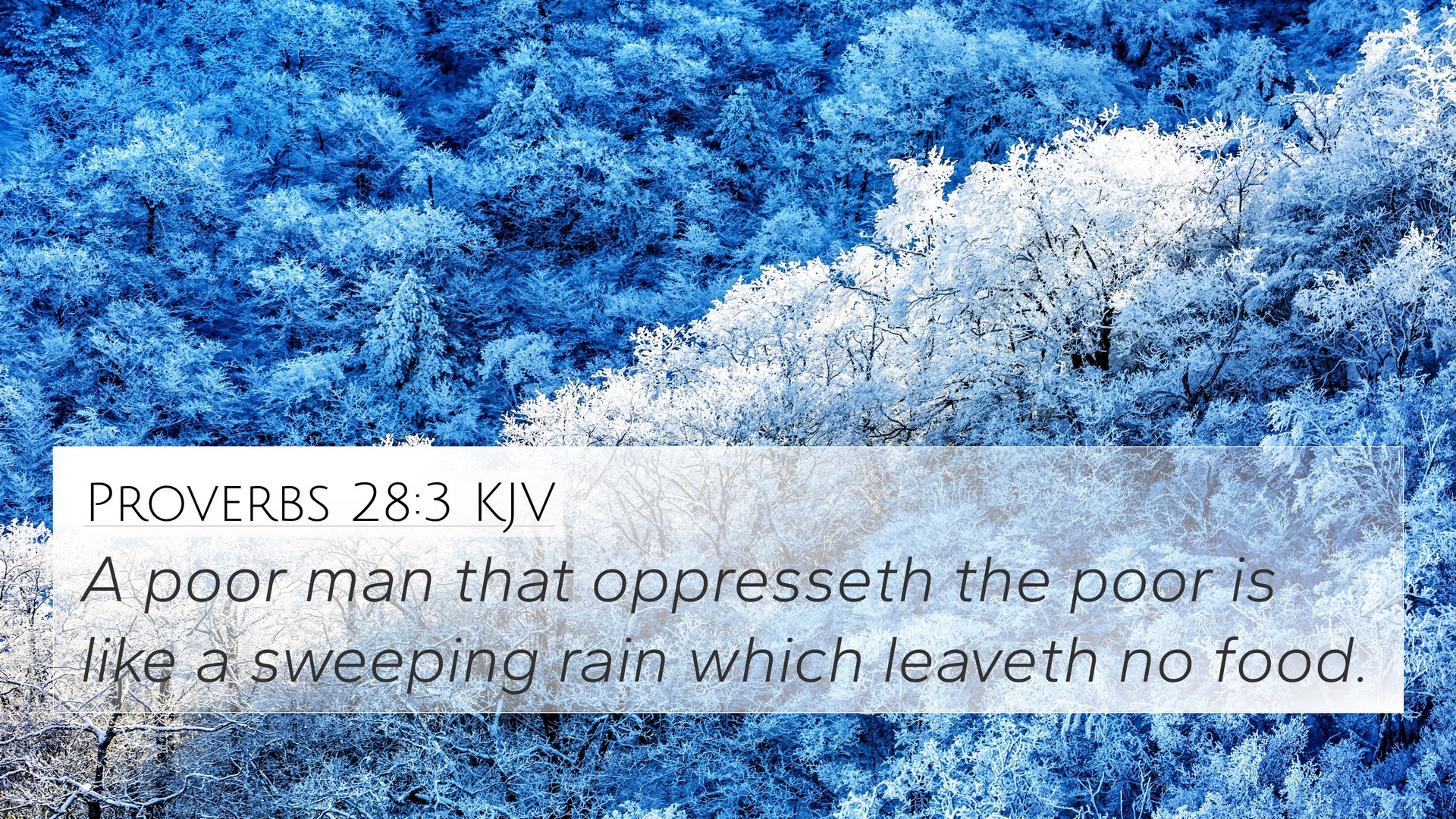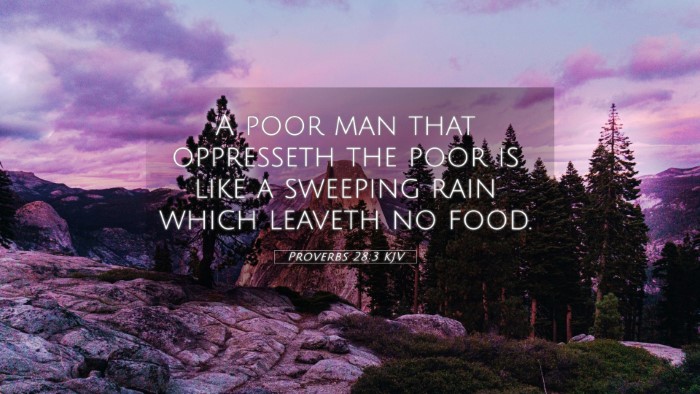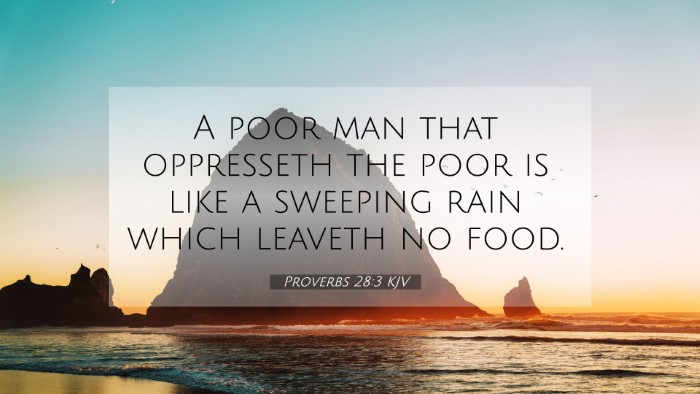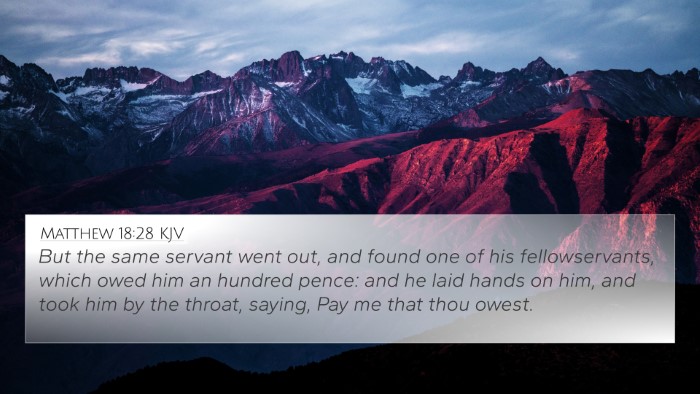Understanding Proverbs 28:3
Proverbs 28:3 states: "A poor man who oppresses the poor is like a sweeping rain that leaves no food." This verse provides a vivid illustration of the injustice and futility in the actions of one who is poor yet exploits those in an even more disadvantaged situation. Below, we will explore the insightful interpretations from various public domain commentaries, specifically those of Matthew Henry, Albert Barnes, and Adam Clarke, to bring a comprehensive understanding of this scripture.
Summary of Interpretations
-
Matthew Henry's Commentary:
Matthew Henry emphasizes the moral corruption inherent in a poor man who oppresses others of his kind. He likens such behavior to a destructive storm that ravages the land without providing any benefit, highlighting the idea that true character is reflected not in status, but in one's treatment of others, particularly those vulnerable.
-
Albert Barnes' Notes:
Barnes interprets the proverb as a warning against hypocrisy. The verse presents a stark contradiction where someone in need becomes a source of oppression for their own. He points out that social injustices often yield catastrophic consequences, akin to agricultural droughts that leave the land barren.
-
Adam Clarke's Commentary:
Clarke highlights the ethical implications of poverty and oppression. He reasons that while poverty is a hardship, turning against fellow citizens in distress only perpetuates suffering. Furthermore, he reflects on the consequences of such actions for both the oppressor and the oppressed.
Thematic Connections
This verse can be cross-referenced with several other scriptures that reinforce its themes:
- Proverbs 14:31: "Whoever oppresses a poor man insults his Maker, but he who is generous to the needy honors him." This verse echoes the importance of treating the vulnerable with dignity and respect.
- Proverbs 22:22-23: "Do not rob the poor because he is poor, or crush the afflicted at the gate, for the Lord will plead their cause and rob of life those who rob them." This emphasizes God's concern for justice for the underprivileged.
- Jeremiah 22:16: "He judged the cause of the poor and needy; then it was well. Is not this to know me?" This verse connects knowledge of God with the defense of the needy.
- Luke 6:20: "Blessed are you who are poor, for yours is the kingdom of God." This reflects Jesus' teachings on the virtues of humility and compassion towards the poor.
- James 2:6-7: "But you have dishonored the poor man. Are not the rich the ones who oppress you, and the ones who drag you into court?" This verse addresses similar themes of social injustice and oppression.
- Isaiah 10:1-2: "Woe to those who decree iniquitous decrees, and the writers who keep writing oppression..." This serves as a warning against systemic injustice and exploitation.
- Psalms 82:3: "Give justice to the weak and the fatherless; maintain the right of the afflicted and the destitute." This calls for proactive justice on behalf of the oppressed.
- Ezekiel 18:7: "He does not oppress anyone, but returns the pledge, and commits no robbery." This verse highlights the moral obligations of individuals toward one another.
- 1 John 3:17: "But if anyone has the world's goods and sees his brother in need, yet closes his heart against him, how does God's love abide in him?" This emphasizes the necessity of compassionate action towards those in need.
- Zechariah 7:10: "Do not oppress the widow, the fatherless, the sojourner, or the poor; and let none of you devise evil against another in your heart." This serves as a reminder of God's expectations for ethical treatment in community.
Insights on Social Justice from Proverbs 28:3
Proverbs 28:3 serves as a profound reminder of the interconnectedness of human dignity and social responsibility. The verse not only critiques the hypocritical nature of the poor who exploit others but also reflects a wider biblical theme concerning the care for the marginalized. God's consistent call for justice underscores the notion that every individual, regardless of their socioeconomic status, has a moral obligation to uphold the dignity of others.
Concluding Thoughts
In synthesizing these insights, it is evident that Proverbs 28:3 challenges us to examine our own behaviors and attitudes towards the less fortunate. It invites believers to engage in cross-referencing Biblical texts, analyzing broader themes that promote justice and mercy. Engaging with the scripture in this manner not only enriches our understanding but also equips us to embody the principles of love and compassion that are central to the Christian faith.
Practical Applications of Proverbs 28:3
-
Self-Reflection:
Consider your actions and attitudes toward those less fortunate. Are there aspects of your life where you may inadvertently oppress others?
-
Engaging in Community Service:
Find avenues to assist the poor and needy in your community. Serve actively to mitigate the struggles faced by others.
-
Educate Others:
Use the insights from this scripture and its cross-references to advocate for social justice within your community and church.
-
Promote Conversations:
Create forums or discussions that address issues of poverty and oppression, encouraging biblical principles in these dialogues.
-
Prayer for Justice:
Regularly pray for those in need and for the societal structures that lead to oppression.
Further Study and Resources
To deepen your understanding of the themes in Proverbs 28:3 and related scriptures, consider utilizing the following Bible reference resources:
- Bible concordances to explore word relationships.
- Cross-reference guides for thematic study.
- Online Bible tools for keyword searches and thematic studies.
- Books focusing on social justice in biblical texts.
- Study groups that focus on thematic verse connections.



